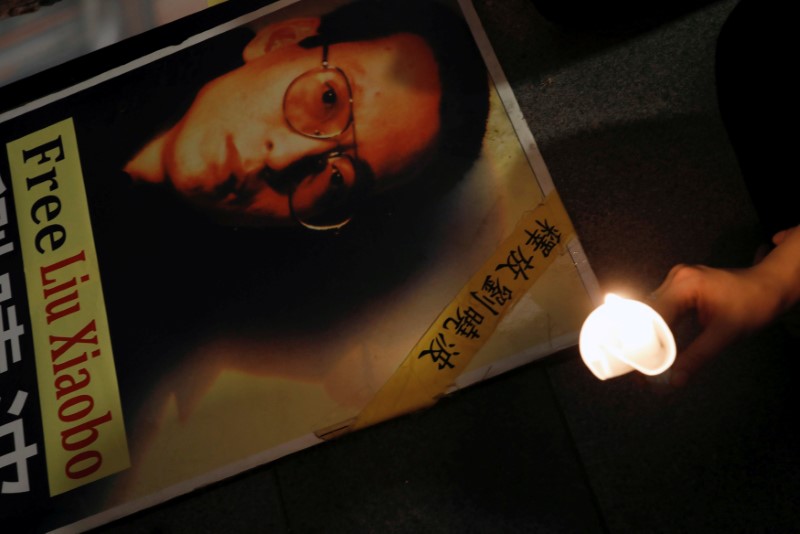By Andrea Shalal and Christian Shepherd
HAMBURG, Germany/BEIJING (Reuters) - The United States is arranging for an American doctor to visit China to examine ailing Chinese dissident Liu Xiaobo, and a German cancer specialist is at the hospital in northeastern China that is treating the Nobel Peace laureate, U.S. and German sources said on Friday.
Liu, 61, was jailed for 11 years in 2009 for "inciting subversion of state power" after he helped write a petition known as "Charter 08" calling for sweeping political reforms.
He was recently moved from jail to a hospital in China's northeastern city of Shenyang to be treated for late-stage liver cancer.
"The U.S. Department of State is facilitating travel for an American medical expert to come to China," said Anna Richey-Allen, a spokeswoman for the U.S. State Department's East Asia bureau. "We have asked that China grant these doctors unhindered access to Liu."
A source at Germany's foreign ministry that the German cancer specialist is at the hospital that is treating Liu.
"We hear that his condition has deteriorated rapidly. We are very concerned about that," the German source said.
The hospital has invited doctors from the United States and Germany to help with Liu's treatment, the Shenyang city justice department said on Wednesday.
On Friday evening, the hospital said that Liu's appetite was "quite poor" and that abdominal fluid that had build up had been drained.
A woman who answered the hospital telephone earlier on Friday said she did not know about Liu's case.
On Thursday, Liu's brother-in-law, Liu Hui, denied that doctors had halted medication for him, in a letter released by the hospital, following rumours that the dissident was too ill for treatment to continue.
A family friend of Liu said his medication had been halted as his liver was unable to take it.
"The Chinese government often pressures family members to write statements or record videos to make claims in its favour," Patrick Poon, a China researcher for rights group Amnesty International, said in a message, referring to the letter.
"If Liu Hui is free, why can't he talk to journalists?" added Poon, who is based in Hong Kong.
Calls have grown from rights groups, international bodies and western governments for China to allow Liu and his wife Liu Xia to be treated overseas if they wish.
The European Parliament on Thursday urged China to immediately release the couple from house arrest, and allow Liu to seek treatment freely.
Chinese Foreign Ministry spokesman Geng Shuang declined on Friday to comment about Liu's treatment and media access to his family.
However, he expressed displeasure at the involvement of the United Nations, after Zeid Ra'ad al-Hussein, the U.N. high commissioner for human rights, met Chinese officials about Liu.
"Relevant U.N. officials should strictly abide by the U.N. charter's purposes and principles, should respect China's judicial sovereignty and not interfere in China's internal affairs," Geng told a daily news briefing.
The U.N. human rights office on Friday said it was very concerned about reports of serious deterioration in Liu's health.
"The High Commissioner has requested that a senior U.N. official be urgently granted access to Liu Xiaobo and to Liu Xia," it said in a briefing note.
"However, we have so far received no response from the Chinese government to this request."
Diplomatic sources in Beijing say China has been nervous that the concerns over Liu could overshadow President Xi Jinping's appearance at a summit of the Group of 20 nations in Hamburg, Germany, on Friday and Saturday.

At the meeting, Xi will seek to project Chinese leadership on issues such as climate change and free trade.